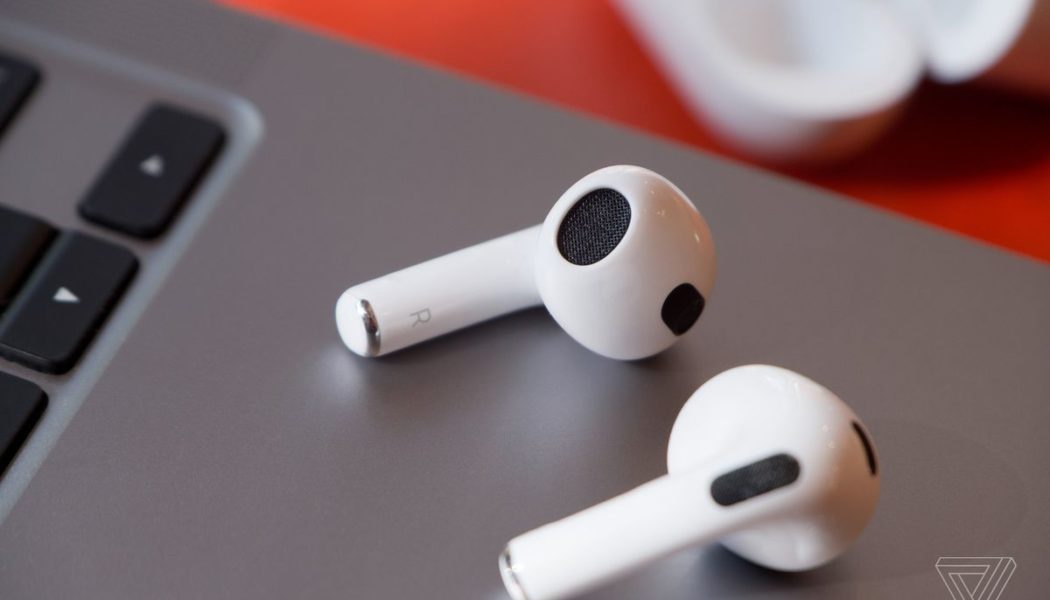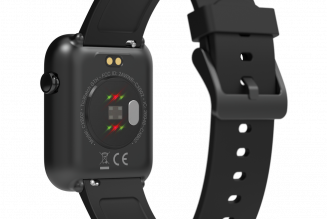At its “Far Out” event on Wednesday, Apple introduced a new pair of AirPods Pro alongside the upcoming iPhone 14 lineup and long-rumored Apple Watch Ultra. The second-gen AirPods Pro are set to arrive on September 23rd, bringing with them a new H2 chip that Apple claims should cancel “up to twice as much noise” as its predecessor, as well as swipe-based controls and a number of other features.
This means that, as of this week, the official AirPods lineup consists of the following models: the second-gen AirPods, the third-gen AirPods, the second-gen AirPods Pro, and the AirPods Max. Also, while Apple no longer sells them, you can also still buy the first-gen AirPods Pro from a number of retailers, including Amazon, Walmart, and Target.
The second-gen AirPods Pro offer a number of improvements over their predecessor, but are they worth the $249 sticker price? With such a wide range of AirPods available at various price points, that’s a tough question to answer. Lucky for you, we’ve compared each AirPods model below to help you decide which might be the best fit for you. We have yet to review the new AirPods Pro, however, we have published our initial hands-on take on the earbuds, which you can check out here.
2022 AirPods lineup comparison
| Specification | AirPods (second-gen) | AirPods (third-gen) | AirPods Pro (first-gen) | AirPods Pro (second-gen) | AirPods Max |
|---|---|---|---|---|---|
| Specification | AirPods (second-gen) | AirPods (third-gen) | AirPods Pro (first-gen) | AirPods Pro (second-gen) | AirPods Max |
| Active noise canceling / reduction | No | No | Yes | Yes | Yes |
| Transparency mode | No | No | Yes | Yes | Yes |
| Connectivity | Bluetooth 5.0 | Bluetooth 5.0 | Bluetooth 5.0 | Bluetooth 5.3 | Bluetooth 5.0 |
| Earbud size (mm) | 40.5 x 16.5 x 18.0 | 30.8 x 18.3 x 19.2 | 30.9 x 21.8 x 24 | 30.9 x 21.8 x 24 | 187.3 x 168.6 x 83.4 |
| Case size (mm) | 53.5 x 44.3 x 21.3 | 46.4 x 54.4 x 21.4 | 45.2 x 60.6 x 21.7 | 45.2 x 60.6 x 21.7 | 134.5 |
| Earbud weight (grams) | 4 | 4.28 | 5.4 | 5.3 | 384.8 |
| Case weight (grams) | 38.2 | 37.91 | 45.6 | 50.8 | 134.5 |
| Battery (earbud) | Up to 5 hours | Up to 6 hours | Up to 4.5 hours | Up to 6 hours | Up to 20 hours |
| Battery (case) | More than 24 hours | Up to 30 hours | More than 24 hours | Up to 30 hours | N/A |
| Water resistance earbuds | No | IPX4 | IPX4 | IPX4 | No |
| Water resistance charging case | No | IPX4 | IPX4 | IPX4 | No |
| Wired charging | Yes, via Lightning | Yes, via Lightning | Lightning connector | Yes, via Lightning | Yes, via Lightning |
| Wireless charging | No | Yes, via Qi-certified or MagSafe chargers | Yes, via Qi-certified or MagSafe chargers | Yes, via Qi-certified or MagSafe chargers | No |
| Included charging cable | Lightning to USB-A | Lightning to USB-C | Lightning to USB-C | Lightning to USB-C | Lightning to USB-C |
| Price | $129 (usually on sale for $99) | 179 (usually on sale for $149.99-$169.99) | $249 (usually on sale for $179) | $249 | 549 (usually on sale for $479) |
| Custom chips | Apple H1 | Apple H1 | Apple H1 | Apple H2 | Apple H1 |
| Availability | Available now | Available now | Available now | Available for preorder | Available now |
Design and build quality
With the exception of the AirPods Max, all of the AirPods in Apple’s current lineup are in-ear, true wireless earbuds. In comparison to the second-gen AirPods, the third-gen model and both generations of the AirPods Pro offer shorter stems that are slightly heavier and wider. If a comfortable fit matters a lot to you, look also to the first and second-gen AirPods Pro. The latter also feature replaceable silicone ear tips in various sizes, though only the second-gen AirPods Pro sport the extra-small sizing. In addition, if you intend to use the earbuds during intense workout sessions, it may be wise to avoid the second-gen AirPods and AirPods Max, as neither of them offer any form of sweat and water resistance.
:no_upscale()/cdn.vox-cdn.com/uploads/chorus_asset/file/23037267/IMG_0044.jpg)
In contrast to the plastic AirPods, the AirPods Max are a large pair of over-ear headphones that offers stainless steel earcups with a curvy mesh headband. Thus, naturally, they’re the heaviest and biggest in the lineup. They also offer more color options; the earbuds only come in white, but you can buy the Max in silver, space grey, blue, pink, and green.
Charging cases (MagSafe, Lightning, etc.)
Apple sells two cases with its earbuds: a wired charging case that charges via a standard Lightning cable and a MagSafe-compatible model that can also charge via Lightning. All of the MagSafe charging cases are compatible with Apple’s MagSafe technology, as well as other Qi-compatible wireless chargers.
However, Apple only sells the second-gen AirPods with the Lightning Charging Case, which only gives your AirPods up to 24 hours of listening time instead of the 30 hours the other cases offer. Unlike the other charging cases in the AirPods lineup, Apple’s Lighting Charging Case also isn’t sweat- or water-resistant. In contrast, you can buy the third-gen AirPods with either a MagSafe Charging Case for $179 or a Lightning Charging Case for $169, though, we’d suggest that you forgo the latter if you can afford to.
:no_upscale()/cdn.vox-cdn.com/uploads/chorus_asset/file/24002965/Apple_AirPods_Pro_2nd_lanyard_loop_lifestyle_220907.jpg)
The first-gen AirPods Pro came with a Lightning-only charging case when they launched in 2019, but it’s become harder to find that model in stock. Now both generations of the AirPods Pro come with a MagSafe charging case, though, the case for the newer model differs from its predecessor and the third-gen AirPods in that it features a built-in speaker and Find My support, which allows you to keep tabs on it more easily. Apple also outfitted it with a built-in loop, allowing you to attach the case to a lanyard.
As for the AirPods Max, they come with their own Smart Case, which is designed to preserve battery life by putting the headphones into a very low power state. Sadly, as noted in our AirPods Max review, Apple’s Smart Case is not particularly great, mainly because it does a bad job of protecting your headphones. The case also gets dirty too easily and has too many slits, which makes it easy for the ear cups to get scratched. Unlike Apple’s latest MagSafe Charging Case, it’s also not water-resistant.
Noise cancellation, spatial audio, and other features
When it comes to sound quality, we can safely say that all of Apple’s AirPods — with the exception of the second-gen AirPods Pro, which we have yet to test — do a great job. Yet each model offers a different set of features, some of which make for a better listening experience.
If you’re looking for a pair of noise-canceling earbuds, you’ll want to check out the AirPods Max or either generation of the AirPods Pro. All three offer active noise cancellation, which silences background noise so you can better focus on what you’re listening to. They also offer a helpful transparency mode, so you can hear ambient sounds around you while listening to music and other audio content.
:no_upscale()/cdn.vox-cdn.com/uploads/chorus_asset/file/19336093/akrales_191030_3763_0378.jpg)
However, where they differ is chips. The AirPods Max and the bulk of Apple’s AirPods lineup, including the first-gen AirPods Pro, are powered by Apple’s H1 chip, while the second-gen AirPods Pro uses Apple’s new H2 chip. As a result, the second-gen AirPods Pro offer an improved Adaptive Transparency mode that should help reduce harsh noises in your environment, along with better acoustics. Apple also says the new AirPods Pro can cancel up to twice the amount of noise as the first-gen AirPods Pro, a claim we’ve yet to test.
:no_upscale()/cdn.vox-cdn.com/uploads/chorus_asset/file/24008128/Apple_AirPods_Pro_2nd_gen_iPhone_14_Pro_2up_Spatial_Audio_220907.jpg)
With the exception of the entry-level AirPods, each pair of AirPods offer personalized spatial audio support with dynamic head tracking across all Apple devices. As a result, the more recent AirPods models offer a more immersive, theater-like sound quality experience than the second-gen model, which lacks said feature. The second-gen model also lacks adaptive EQ, which supposedly adjusts output based on your ear shape, and custom high-excursion Apple drivers, which deliver more powerful bass. All except for the AirPods Max also include a custom high dynamic range amplifier that offers clear sound and lengthens battery life.
Finally, while the second-gen AirPods, first-gen AirPods Pro, and AirPods Max all offer dual optical sensors that help detect when they’re in (or on) your ears, the third-gen AirPods and second-gen AirPods Pro do not. Instead, the newer models use a skin detection sensor to more accurately gauge whether your AirPods are in your ears or not and, thus, whether they should play or pause audio.
Microphones
All of Apple’s in-ear AirPods offer two beamforming mics in each ear cup, with technology that should reduce outside noise and help better focus on your voice. However, unlike the other earbuds, the second-gen AirPods lack inward-facing microphones, so they’re unable to listen inside of your ear to reduce internal sounds. The AirPods Max, meanwhile, feature nine microphones: eight for active noise cancellation and three for voice pickup.
:no_upscale()/cdn.vox-cdn.com/uploads/chorus_asset/file/22936802/Screen_Shot_2021_10_18_at_2.19.16_PM.png)
Battery life
The AirPods Max are, unsurprisingly, the clear winner in terms of battery life. Apple says they offer up to 20 hours of listening time on a single charge with active noise cancellation or the transparency mode on. With spatial audio enabled, the AirPods Max offer up to 20 hours of video playback on a single charge. Moreover, Apple claims a mere five minutes of charging can provide around 1.5 hours of listening time.
Interestingly, despite being more expensive than the third-gen AirPods, the second-gen AirPods Pro offer about the same battery life, while the first-gen AirPods Pro offer even less. Apple says both the third-gen AirPods and second-gen AirPods Pro offer a maximum of six hours of listening time and up to 30 hours with the included charging case; however, the new AirPods Pro offer up to 5.5 hours of battery life with spatial audio and head tracking turned on, whereas the third-gen AirPods offer a maximum of five hours.
In contrast, the first-gen AirPods Pro offered only a maximum of 4.5 hours of listening time with active noise cancellation on and five hours with it off, and up to 24 hours of listening time with the included charging case. If you were to charge any of the three models for five minutes, however, you should be able to get around an hour of listening time.
Naturally, the second-gen AirPods offer the least amount of battery life in the lineup. Apple claims the older AirPods offer up to five hours of listening time on a single charge, and over 24 hours of listening time with the included charging case. On paper, the second-gen AirPods need to be in the case for 15 minutes to achieve up to three hours of listening time.
Controls
The second-gen AirPods Pro are Apple’s first earbuds to offer swipe-based controls. This means you can swipe up or down on the stem to adjust the volume. However, like their predecessor and the in-ear AirPods, they still rely on tactile buttons for other settings. For example, you’ll need to click the stem to pause, play, or answer a call on the third-gen AirPods and both generations of the AirPods Pro. No matter which AirPods model you buy, however, you’ll be able to launch Siri using a simple voice command.
:no_upscale()/cdn.vox-cdn.com/uploads/chorus_asset/file/24008140/Apple_AirPods_Pro_2nd_gen_Touch_control_220907.jpg)
In contrast, the over-ear AirPods Max offer physical controls. Each pair features a Digital Crown — a larger version than the dial on the Apple Watch — as well as a secondary button you can use to alternate between active noise cancellation and transparency modes. However, there is no power button. Rather, they turn on when placed on your head.
Compatibility (and connectivity)
No matter which AirPods you buy, you’ll be able to automatically switch between your various Apple devices. All of the AirPods are also compatible with the latest iPhones, iPads, Apple Watches, and Macs. However, the second-gen AirPods also work with older devices, like the iPhone 6 and the second-generation iPad Mini.
Pricing and availability
The most obvious difference between each AirPods model is the price. The $129 second-gen AirPods start at $129, although we often see third-party retailers like Amazon sell them for $99. The third-gen AirPods, meanwhile, vary in price depending upon which one you buy. Apple sells the version with a Lightning Charging Case for $169, while the model with the MagSafe charging case goes for $179. However, we regularly see the third-gen earbuds sell for anywhere between $149.99 and $169.99 at Amazon, Target, and elsewhere.
While Apple no longer sells them, you can also still buy the first-gen AirPods Pro on sale normally for around $174 instead of $249 from various retailers, including Walmart. The newest AirPods Pros, aka the second-gen model, are currently available for preorder for $249, but will likely go on sale as we approach Black Friday. Finally, the most expensive pair of AirPods, the AirPods Max, are listed at $549 but are often on sale for around $479.
Which should you buy?
Each model in the current AirPods lineup offers good sound quality, reliability, and great ease of use. But which you should buy depends upon your needs and budget.
If you want noise-canceling, over-ear headphones, it’s an easy choice: you should buy the AirPods Max. Yet things get a little more complex if you’re on the market for a pair of true wireless earbuds. If you want active noise cancellation, you’ll want to consider the AirPods Pro, as they’re the only earbuds in the current AirPods lineup that offer it. You may also want to consider the AirPods Pro (or even the third-gen AirPods) if you often engage in workouts, as they offer IPX4 sweat and water resistance. Plus, both the first- and second-gen AirPods Pro come with replaceable ear tips, which allow for a more secure, comfortable fit.
:no_upscale()/cdn.vox-cdn.com/uploads/chorus_asset/file/22173543/IMG_6828_3.jpg)
If you want the model with the best noise cancellation, though, that’s likely to be the second-gen AirPods Pro. While we haven’t yet tested these claims, Apple says they will be able to cancel out twice as much noise as their predecessor, while offering an improved Adaptive Transparency mode. If you have very small ears, you may want to opt for the second-gen AirPods Pro, as they come with a pair of extra-small ear tips.
On the other hand, if you’re looking for something more budget-friendly, the first-gen AirPods Pro are often on sale for around $179.99. That’s roughly the same price as third-gen AirPods, and only $50 more than the entry-level, second-gen AirPods. Yet they offer active noise cancellation, too, as well as three replaceable sets of customizable ear tips. They also offer features the third-gen AirPods boast over the second-gen AirPods, like sweat and water resistance, a MagSafe charging case, and greater spatial audio support.

/cdn.vox-cdn.com/uploads/chorus_asset/file/22953803/IMG_0044.jpg)
/cdn.vox-cdn.com/uploads/chorus_asset/file/24003014/DSCF9191.JPG)
/cdn.vox-cdn.com/uploads/chorus_asset/file/22648758/AirPods_Max_Front_Press_Photo.jpeg)








